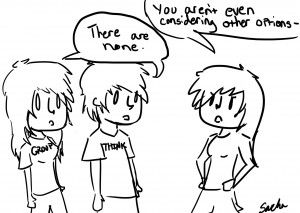
“Groupthink” does, admittedly, sound like the title of a psychological thriller, and the premise a bit like the set-up of an Orwellian dystopia, but unfortunately, it’s closer to home. Groupthink is more or less a standard component of any unified group of people — whether on a macro level (country of origin) or a micro level (school clique). There is something inherent in us that spurs the desire to find belonging within a larger group, to feel that we are part of a whole and central to the self-conceptions of our individual identities.
Rather than seriously pursue truth, which requires questioning one’s own fervently held beliefs and carefully considering oppositional views, we are lazily content to disregard anything that challenges the harmony of our ideologies.
Groupthink occurs when the desire for a cohesive group identity and ideological harmony are prioritized above all else. The fear of disrupting group unity and of being made a group outcast lends itself to a generating of blind loyalty, the goal of which is largely preventative. The real danger of groupthink is that it creates a self-inflicted barrier to any kind of critical analysis of accepted norms within the group. Members of the group fear that an intrusion of outside ideas could challenge the group’s homogeneity.
This particular phenomena has been on my mind lately because in watching the development of events across our sociopolitical landscape, it seems that the fierce and often baseless loyalty with which people cling to their beliefs is a very real affront to progress of any kind.
We live in a country that extols individual liberty as a foundational virtue. Our collective national identity is rooted in the Horatio Alger narrative of triumphant individualism, of independent will being strong enough to overpower societal ills. However, while we deeply value individual liberty as an American ideal, the truth is that the rationalization of our beliefs is deeply entrenched in our identification with a group. The group exists, and we ascribe to the group, because its existence provides the necessary affirmation we need to continue on our desired path with the knowledge that we are right and anyone outside of the group is wrong. Their support allows us to reinforce our belief systems until they are utterly logic-proof and even common-sense-proof. Once you’ve locked yourself in the ideological prison of groupthink, it becomes incredibly easy to rationalize your beliefs, often equipped more with rhetorical flourishes than with actual reason.
This is why we often go through the motions expected of a “group member” without questioning our own motives or the motives of others; as a result, we fail to examine the basis of our belief systems. This can manifest itself at various societal levels in very different ways. As professed members of a certain political party, we may be likely to welcome opinions automatically from our own side of the aisle and thus reject others. The perceived ethos of a pundit may lend baseless credibility, within the group circle, to whatever they espouse, so they are judged on group-assigned status rather than the content of their words.
If we are brave enough to examine the basis of our ideologies—to keep asking why we believe something to be true until we reach the heart of the matter—we may find that what we tell ourselves are logically sound and well-thought-out beliefs are more thoughtless and petty than we’d like to admit.
As long as we stay in our ideological prisons, refusing to recognize the potential validity of outside perspectives, we will resist progress. We will continue to proclaim loudly without critically examining, willfully turning our backs to anything that might shatter the groupthink-induced illusion that we are justified in clinging to our beliefs.
——————————————————————————————————————
Follow The Graphic on Twitter: @peppgraphic
